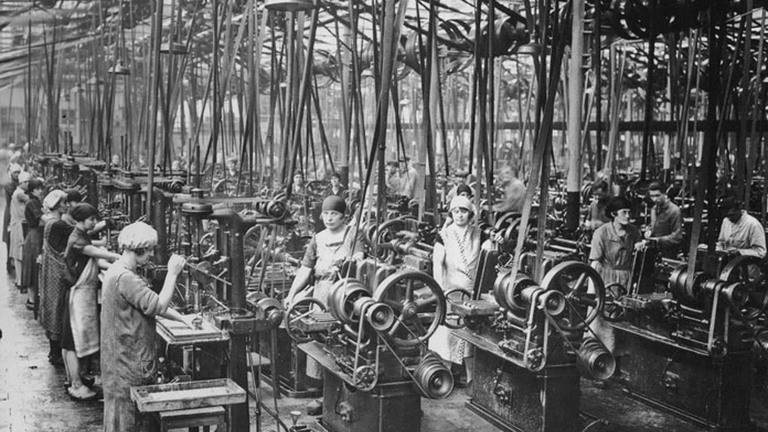The question “What is Industrial Engineering?” is constantly asked by people who do not know this profession. People who study or work in the field of industrial engineering are often faced with such questions. Industrial engineering is a broad and interdisciplinary field that focuses on designing, improving, and optimizing processes, systems, and organizations. Industrial engineers use their engineering, mathematics, and science knowledge to solve complex problems and improve efficiency.
Related: What is an Industrial Engineer? What Does an Industrial Engineer Do?
Industrial engineering has a long and rich history, dating back to the late 18th century. The field has evolved to meet the needs of a changing world, but its core principles remain the same. Industrial engineering is an important field with a wide range of applications. Industrial engineers are employed in various industries, including manufacturing, healthcare, and service. They play a vital role in improving the efficiency and productivity of organizations.
In this blog post, we will explore the basics of industrial engineering. We will discuss the history of the field, its importance, and the future of industrial engineering.

Contents
- 1 What is Industrial Engineering?
- 2 Industrial Engineering History
- 3 Why is Industrial Engineering Important?
- 4 What does an Industrial Engineer do?
- 5 Is Industrial Engineering Still in Demand?
- 6 Industrial Engineering Salary
- 6.1 1) Switzerland
- 6.2 2) United States of America (USA)
- 6.3 3) Denmark
- 6.4 4) United Kingdom
- 6.5 5) United Arab Emirates
- 6.6 6) Australia
- 6.7 7) Sweden
- 6.8 8) Qatar
- 6.9 9) Germany
- 6.10 10) Norway
- 6.11 11) China
- 6.12 12) South Korea
- 6.13 13) Brazil
- 6.14 14) Taiwan
- 6.15 15) Canada
- 6.16 16) France
- 6.17 17) Japan
- 6.18 18) Colombia
- 6.19 19) Netherlands
- 6.20 20) India
- 7 Industrial Engineering-Related Videos
What is Industrial Engineering?
Industrial engineering is a field of engineering management that focuses on improving the production and manufacturing of industrial or consumer products. It encompasses various disciplines. Aims to enhance efficiency, reduce costs, ensure quality control, prioritize employee health and safety, protect the environment, and comply with government regulations.
Industrial engineers work towards reducing inefficiencies in time, money, materials, energy, and other resources by optimizing procedures and manufacturing processes. They apply their expertise and abilities to define, anticipate, and assess the results of these processes and systems.
This enables the development of new processes and systems, with overlaps in business administration activities, production and manufacturing engineering, operations research, systems and supply chain engineering, management science and engineering, safety engineering, ergonomic and logistics engineering, and more, depending on the specific requirements of the user.
People who graduate from the Department of Industrial Engineering can work with the following titles;
- Industrial Engineer
- Industrial Production Manager
- Planning Engineer
- Production Engineer
- Management Analyst
- Logistic
- Supply Chain Manager
- Quality Engineer
- Quality Assurance Manager
- Engineering Manager
- Industrial Engineering Manager
- Operations Analyst
- Ergonomist
- Project Manager
- Supply Chain and Logistics Manager
- Human Factors Engineer
The titles that graduates of industrial engineering can take are not limited to these. They can also work in other titles according to the needs of the company they work for.
Industrial Engineering History
The origins of industrial engineering can be traced back to the start of the Industrial Revolution in the late 18th century. With the advent of inventions like the spinning jenny, flying shuttle, and steam engine, manual labor began to be replaced by mechanization, allowing for larger-scale manufacturing in centralized locations. This led to the establishment of factories and mills across Britain, giving rise to the concept of industrialized production systems.
Adam Smith’s influential work, ‘The Wealth of Nations,’ introduced ideas such as the division of labour and the ‘Invisible Hand’ of capitalism, which laid the foundation for the factory system. James Watt and Matthew Boulton then established the world’s first integrated machine manufacturing facility, incorporating principles of waste reduction, cost control, increased productivity, and employee skills training.
Related: What is an Industrial Engineer? What Does an Industrial Engineer Do?
In the early 19th century, Charles Babbage’s visits to factories in Britain and the United States further expanded on these concepts. His book, ‘On the Economy of Machinery and Manufacturers,’ delved into industrial engineering principles, exploring the time required for tasks and the potential for subdividing them into smaller, repetitive tasks to enhance overall efficiency.
Early innovations also included the concept of interchangeable parts, pioneered by Eli Whitney and Simeon North, who manufactured firearms for the US Government. By mass-producing standardized parts that could be used in various finished products, they could reduce costs by minimizing the need for specialized workers.
However, it was Frederick Taylor (1865-1915) who truly established the discipline of industrial engineering with his introduction of scientific management and time-and-motion study. His books, ‘Shop Management’ and ‘The Principles of Scientific Management,’ published in the early 20th century, presented various methods for improving efficiency, including the development of standardized work processes.

Why is Industrial Engineering Important?
Industrial engineering plays a crucial role in both the production and consumption of products, drawing upon knowledge from various scientific disciplines. By enhancing processes and designs, industrial engineers strive to optimize efficiency. This not only benefits businesses by saving time, money, resources, energy, and manpower but also ensures the safety and quality of the end product or process.
Through analysis, design, prediction, and evaluation, industrial engineers identify and eliminate obstacles, resulting in higher quality and more efficient processes and devices. Therefore, an industrial engineer not only ensures that the device you are currently using was manufactured cost-effectively, making it more affordable for you but also guarantees its safety, preventing any potential hazards while in use.
What does an Industrial Engineer do?
Industrial engineers play a pivotal role throughout the entirety of production and processing. Their responsibilities encompass the design of novel products or processes and the enhancement of existing ones. They apply their problem-solving skills to devise effective solutions, ensuring optimal performance.
Among the tasks entrusted to industrial engineers is the design of new equipment and the formulation of specifications for externally procured equipment, guaranteeing adherence to requirements. Their involvement extends to repurposing existing equipment or facilities, along with the design of fresh processes, tools, and procedures.
To carry out these responsibilities successfully, industrial engineers need a comprehensive understanding of diverse engineering disciplines, work processes, tools, equipment, and materials. This knowledge equips them to design systems and processes that meet standards in terms of cost, quality, safety, and the environment.
Industrial engineers frequently employ computer-aided design (CAD) systems for equipment and facility design, as well as computer modeling for simulating processes and supply chains. These tools contribute to efficiency improvements and cost reductions.
Beyond their design duties, industrial engineers actively participate in activities such as production and operations planning, production and operations management, materials handling, and logistics and operations.
Is Industrial Engineering Still in Demand?
Industrial engineering remains highly sought after, and the field continues to attract a significant number of students. The prospects in industrial engineering are diverse and promising, with a projected growth rate of 10% between 2019 and 2029. This growth rate surpasses that of numerous other occupations, highlighting the strong demand for industrial engineers.
The significance of enhancing efficiencies and minimizing expenses remains a key priority for various industries. Consequently, the demand for industrial engineers will persist.
The extensive range of roles undertaken by industrial engineers serves as a testament to the current demand for this field. Some of these roles include;
- Behavioral economics
- Energy engineering and management
- Facilities engineering
- Financial engineering
- Human factors and safety engineering
- Information systems engineering and management
- Manufacturing engineering
- Methods engineering
- Operations engineering, management, and optimization
- Organization development and change management
- Policy planning
- Production engineering
- Quality and Reliability Engineering
- Supply chain management and logistics
- Systems engineering, simulation, and analysis

Industrial Engineering Salary
Industrial engineering salary is a key consideration for professionals and employers alike. As businesses increasingly focus on efficiency, the demand for skilled industrial engineers is rising. The compensation for industrial engineers varies based on factors like education, experience, specialization, and location. Those with advanced degrees and a successful track record often command higher salaries. Industries like manufacturing and technology, where industrial engineers play a vital role, tend to offer competitive compensation.
The industrial engineering salaries below are average salaries. Salaries vary from company to company. The industrial engineering salary scale for some countries is as follows;
1) Switzerland
Industrial engineers in Switzerland earn an average annual salary of 97,201 Swiss kroner. The lowest-paid industrial engineer earns 39,852 Swiss kroner and the highest-paid one earns 149,869 Swiss kroner annually.
2) United States of America (USA)
Industrial engineers in the US earn an average annual salary of $72,925. The lowest-paid industrial engineer earns $18,000 and the highest-paid earns $133,500 annually.
3) Denmark
An industrial engineer working in Denmark receives an average annual salary of $62,019. The lowest-paid industrial engineer works for $50,000 and the highest paid for $77,000 annually.
4) United Kingdom
Industrial engineers in the UK earn an average annual salary of 33,494 Pounds. The lowest-paid industrial engineer works for 24,000 Pounds and the highest for 43,000 Pounds per year.
5) United Arab Emirates
Industrial engineers in the United Arab Emirates earn an average annual salary of 114,648 UAE Dirhams. The lowest paid industrial engineer works for 30,000 UAE Dirhams and the highest paid for 352,000 UAE Dirhams per year.
6) Australia
Industrial engineers in Australia earn an average annual salary of AUD 71,300. The lowest paid industrial engineer works for 38,000 Australian Dollars and the highest paid for 100,000 Australian Dollars per year.
7) Sweden
Industrial engineers in Sweden earn an average annual salary of SEK 501,352. The lowest-paid industrial engineer earns 205,554 Swedish Krona and the highest-paid industrial engineer earns 772,082 Swedish Krona annually.
8) Qatar
Industrial engineers in Qatar earn an average annual salary of 174,972 Qatari Riyals.
9) Germany
Industrial engineers in Germany earn an average annual salary of 45,271 euros. The lowest-paid industrial engineer earns 34,000 Euros and the highest-paid one earns 66,000 Euros annually.
10) Norway
Industrial engineers in Norway earn an average annual salary of 562,742 Norwegian Kroner. The lowest-paid industrial engineer works for 230,724 Norwegian Kroner and the highest for 866,623 Norwegian Kroner per year.
11) China
Industrial engineers in China earn an average annual salary. The lowest-paid industrial engineer earns 316,159 Chinese Yuan and the highest-paid one earns 486,884 Chinese Yuan per year.
12) South Korea
Industrial engineers in South Korea earn an average annual salary of 48,009,275 South Korean Won.
13) Brazil
Industrial engineers in Brazil earn an average annual salary of 114,000 Brazilian Reals. The lowest-paid industrial engineer works for 63,000 Brazilian Reals and the highest for 168,000 Brazilian Reals annually.
14) Taiwan
Industrial engineers in Taiwan earn an average annual salary of 1,001,681 New Taiwan Dollars. The lowest-paid industrial engineer works for 410,689 New Taiwan Dollars and the highest-paid one works for 1,542,588 New Taiwan Dollars per year.
15) Canada
Industrial engineers in Canada earn an average annual salary of 59,726 Canadian dollars. The lowest paid industrial engineer works for 48,000 Canadian Dollars and the highest paid for 80,000 Canadian Dollars per year.
16) France
Industrial engineers in France earn an average annual salary of 52,693 euros. The lowest-paid industrial engineer works for 21,604 Euros and the highest for 81,147 Euros per year.
17) Japan
Industrial engineers in Japan earn an average annual salary of 7,030,000 Japanese Yen. The lowest paid industrial engineer works for 4,512,500 Japanese Yen and the highest paid for 11,072,000 Japanese Yen per year.
18) Colombia
Industrial engineers in Colombia earn an average annual salary of 19,533,406 Colombian Pesos. The lowest paid industrial engineer works for 653,000 Colombian Pesos and the highest paid for 118,000,000 Colombian Pesos per year.
19) Netherlands
Industrial engineers in the Netherlands earn an average annual salary of 40.740 Euros. The lowest-paid industrial engineer earns 31.000 Euros and the highest salary is 73.000 Euros per year.
20) India
Industrial engineers in India earn an average annual salary of 31,000. The lowest-paid industrial engineer works for 195,000 Indian rupees and the highest for 971,000 Indian rupees annually.
Industrial engineers in the countries listed above earn quite high salaries. In contrast, the lowest-paid industrial engineers work in the Philippines. Industrial engineers are paid an average of 232,699 Philippine Pesos per year in the Philippines. The lowest salary is 15,000 and the highest is 474,000 Philippine Pesos.
Industrial Engineering-Related Videos
We would like to share with you videos that answer the question “What is Industrial Engineering?”. This video answers your questions in the best way possible. You can click HERE for more videos.
